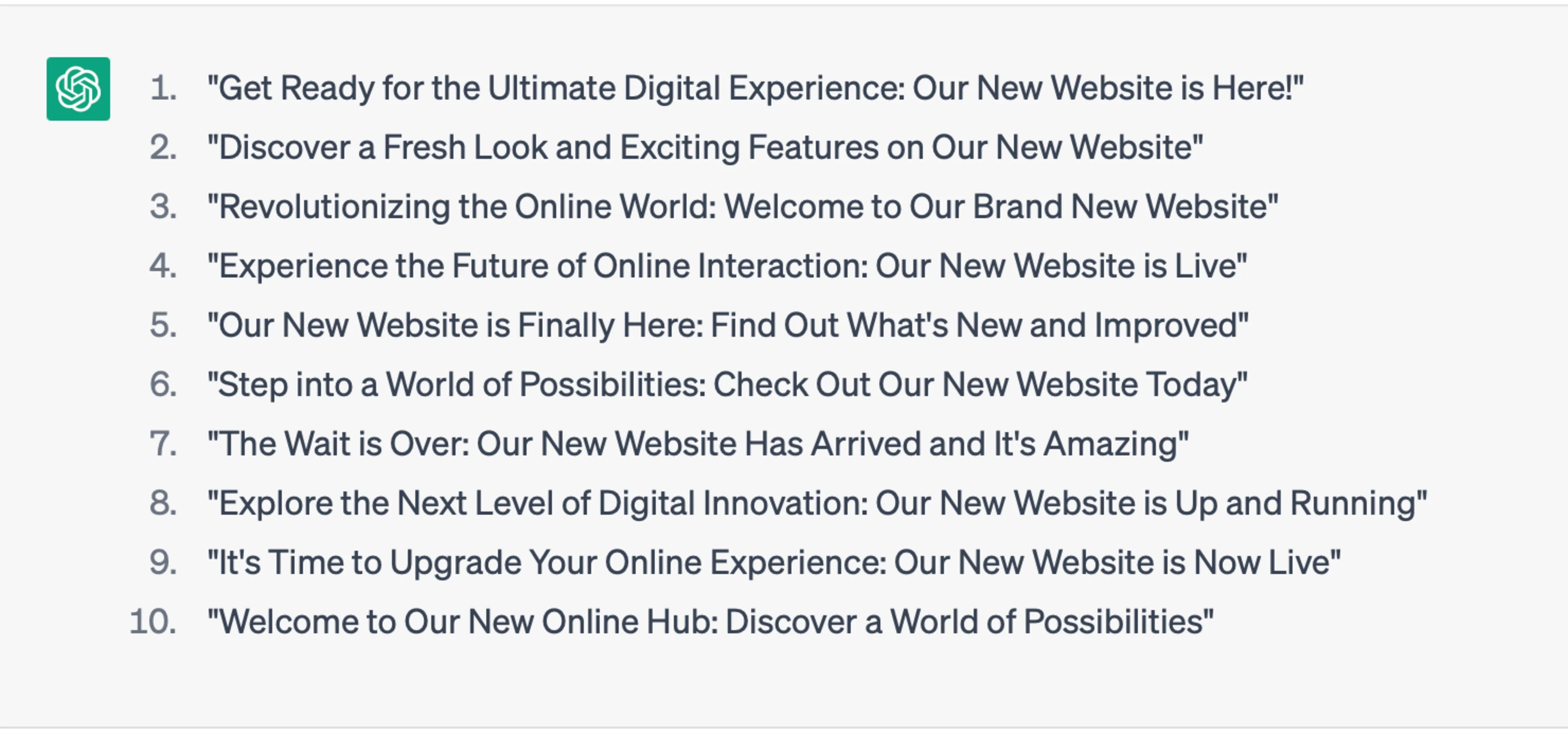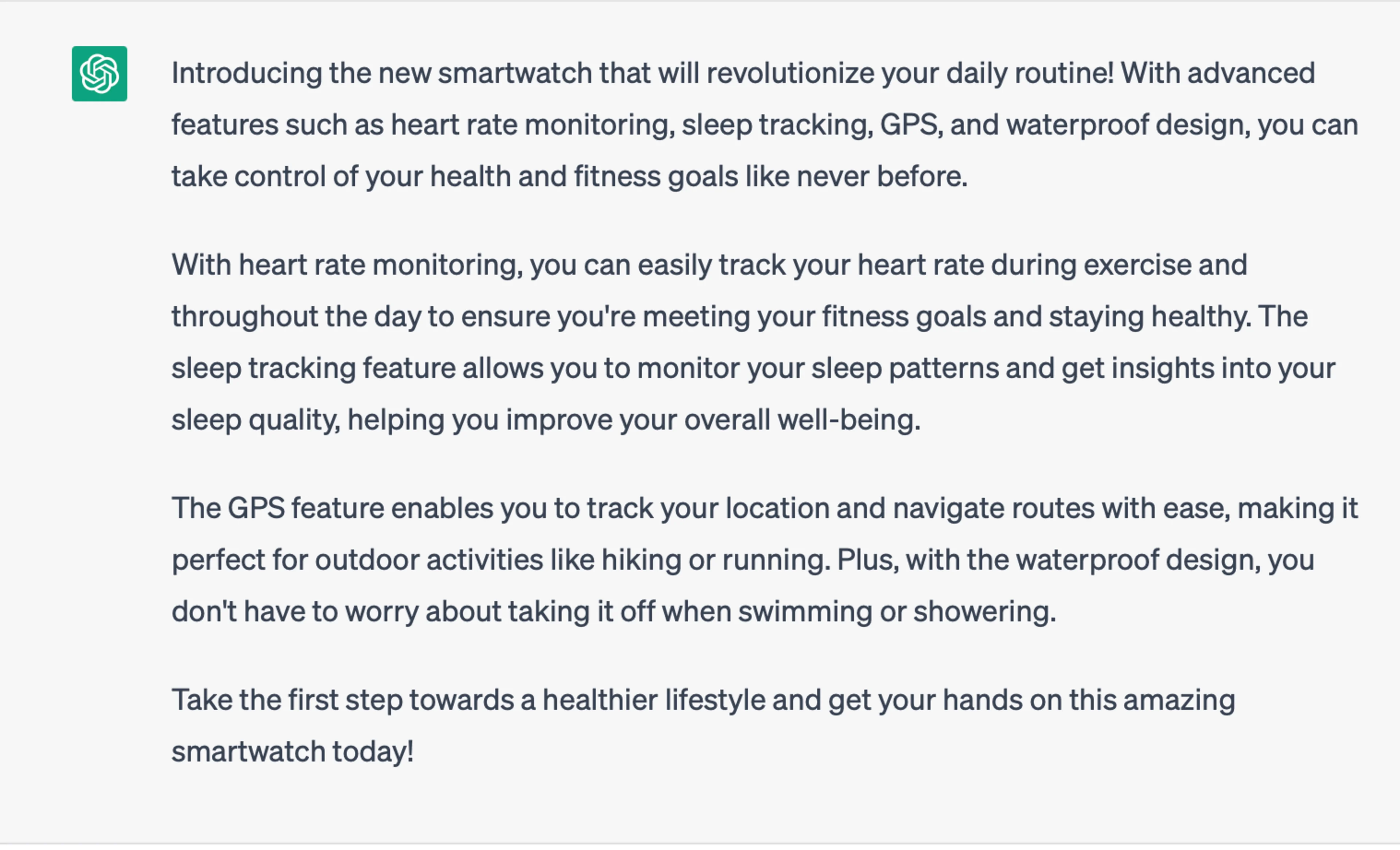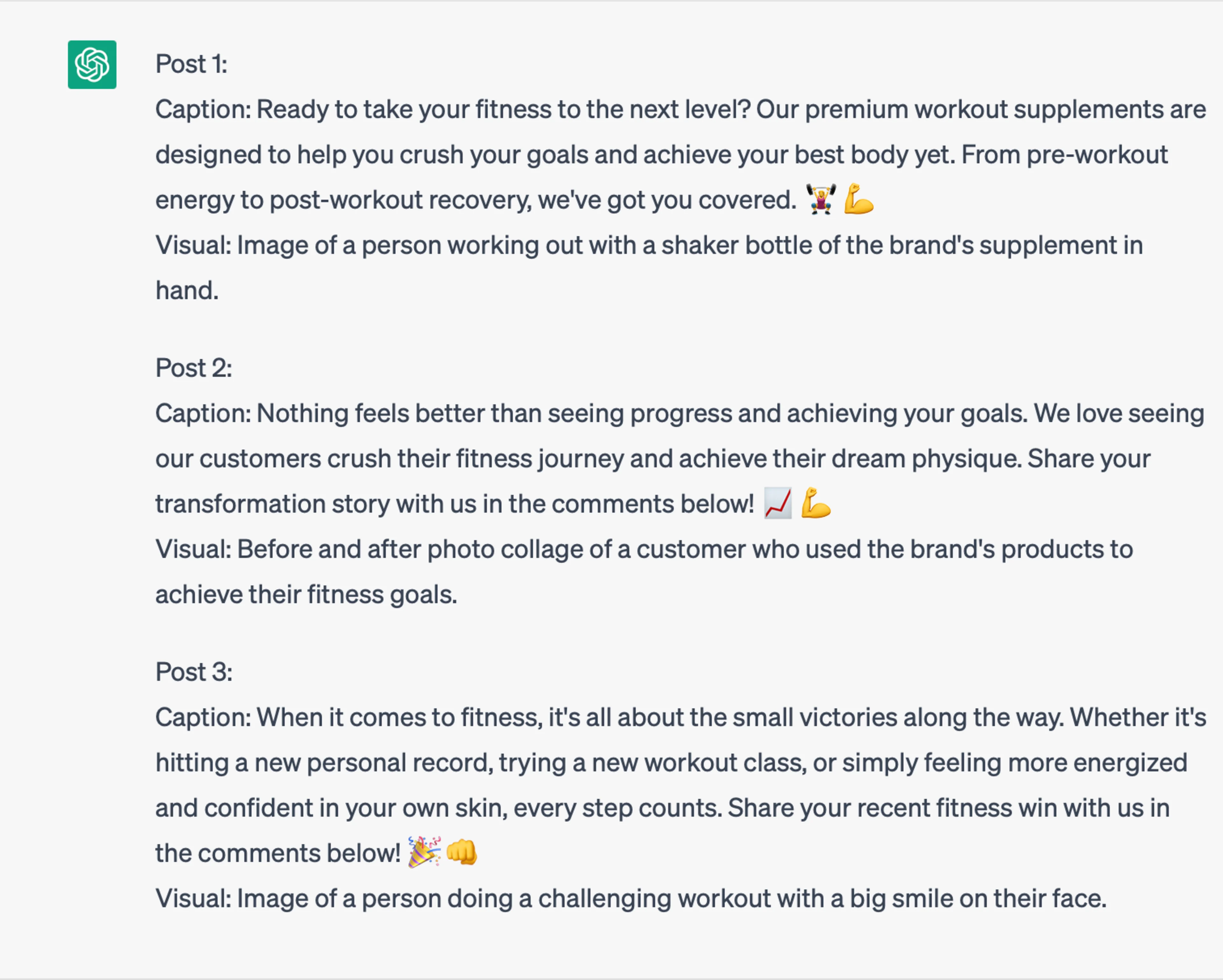A Beacon of Copywriting Future: Demystifying Chat GPT and Its Impact on Copywriters
As copywriters, we have witnessed the industry's evolution from traditional methods to modern digital techniques, and Chat GPT bots are the latest addition to this evolution.
The talks and concerns around this fast-learning technology grow every minute. Is it scary? Maybe. (All the movies about Artificial Intelligence escalate the vision a bit.) But are there any actual threats? Let's breathe in and out and think about it again (the last time, I promise).
#Unraveling the Essence of Chat GPT
How many times have you sat in front of a blank page, struggling to come up with a catchy headline or tagline? We've all been there at least a couple of times. And now you can input a few key phrases or words, and Chat GPT will do the abracadabra thing, aka generate multiple options for you to choose from.
To stop contemplating the chances ChatGPT could steal your job as a copywriter, we need to understand what it is in the first place.
So, it is a variant of the GPT (Generative Pre-training Transformer) model, which is a type of language model developed by OpenAI. It is trained on a dataset of conversational text and is designed to generate human-like responses to text input. And yes, AI's ability to write convincingly as a human may be impressive, as the last two sentences were written by ChatGPT.
But we should keep in mind the "pre-trained" part cause it means it has been trained on documents and texts (over 8 million docs with over 10 billion words on average). By passing years and years of human writing through itself, it can perform natural language processing tasks and generate cohesive and well-written text.
As you see, Chat GPT is an excellent addition to your toolkit. Still, like many tools, this one has a flip side, too — it has limitations, such as being trained on a fixed dataset and not being connected to the internet, which means it may not always have the most up-to-date information. Therefore, do your homework and fact-check the information it provides and not rely solely on it, even if it sounds convincing.
#Exploring the Impact on Copywriters
Honestly, it's still early to talk about the drastic changes in the industry. Copywriters have been honing their craft for years and, even admitting that technology has the potential to revolutionize the way we generate content, remember that it's still a relatively new tool, so we're only beginning to scratch the surface of its capabilities.
That's why it's more realistic to think about only the possible impact, such as helping to generate ideas and improving the quality of the content. In addition, it can save time to focus on more complex and creative tasks, such as developing marketing strategies or crafting brand messaging.
Look at ChatGPT from a different perspective and use it as an advantage — leverage its capabilities to quickly generate ideas and explore different angles for some content.
The chat itself assists you and gives recommendations on how to utilize it effectively in just 3 steps:
Choose the right prompts: When crafting prompts for the bot, ensure they align with the brand voice and tone. This will help the bot generate responses consistent with the brand's messaging.
Train the bot: How? Easy. You only need to feed ChatGPT examples of the brand's existing content and messaging and ensure the model generates consistent results.
Monitor the bot's performance: Keep an eye on the bot's responses and refine them as necessary. Do it on a regular basis to ensure it continues to generate high-quality content.
#Prompts Cheatsheet
Whether you're new to writing or have years of experience, using prompts to their fullest potential requires learning and practicing. However, it will help you develop your skills and take them to the next level.
Following these techniques, you'll see how to state a request to craft attention-grabbing headlines, write product descriptions, and develop a unique voice that resonates with your audience.
#1. Begin with verbs.
You want the AI to deliver impactful results, right? So, kickstart your prompts with action-packed verbs like Create, Write, Make, or Generate. By doing so, you set the tone for active engagement and encourage the AI to produce compelling content that captures attention.
Prompt [Write 10 hookable headlines for a new website launch]

#2. Be explicit.
A lack of clarity is nobody's friend! When creating your prompts, spice it up by adding specific details. It will help make the response laser-focused, relevant, and aligned with user expectations.
Prompt [Write a product description for a new smartwatch that includes features like heart rate monitoring, sleep tracking, GPS, and waterproof design. Make sure to highlight the benefits of each feature and showcase how they can improve the user's daily life.]

#3. Specify the response length.
You see, our friendly AI isn't a mind reader. It doesn't know if you want a concise two-line response or a comprehensive paragraph. So it's always a good idea to specify the response length upfront to avoid any confusion or unnecessary back-and-forth.
Prompt [Create five different subject lines (75 characters max) for an email marketing campaign to promote a new skincare product line. Each subject line should be engaging, informative, and capture the reader's attention to increase open rates and drive sales.]

#4. Share examples.
If you want Chat GPT to take inspiration from existing content pieces, here's a nifty trick: sprinkle your prompts with examples. Sharing examples in your prompts helps the AI generate responses that align with your desired outcome as it learns from these examples and adopts a similar writing style.
Prompt [Develop a memorable and catchy tagline or slogan for a new brand of coffee. The tagline should capture the brand's essence, differentiate it from competitors, and resonate with coffee lovers. Keep it short, simple, and easy to remember like Starbucks' "To get you through those all-nighters"]

#5. Role-play 🙃
Yeah, you read it right) It's time to bring out the role-playing vibes! Ever thought about asking chat GPT to step into different shoes and specific roles? By adding a dash of role-play to your prompts, you unlock a whole new realm of creativity and expertise from AI.
Prompt [Imagine you are a social media manager for a new fitness brand, and your task is to create engaging captions and posts for the brand's social media channels. The posts should highlight the benefits of the brand's products and services, showcase customer success stories, and encourage followers to engage with the brand. Create three social media posts, each with a unique caption and accompanying visual to help build brand awareness and drive engagement.]

The list of prompts can be endless, but I wanted to show you the essence — the more specifics you give the Chat GPT, the higher chances it will generate something useful, but it will definitely need a human touch.
#Devil is not so black as he is painted
It's still uncertain whether a full-blown AI takeover is possible. For now, machines lack the ability to produce truly original content and struggle with the concept of novelty, falling short of displaying empathy and creativity. Thus, human copywriters are better (hell yeah) at creating compelling and original content for campaigns.
However, AI technology is obviously here to stay. It will only improve in assisting us with tasks, so instead of worrying about being replaced by AI, we should focus on how we can utilize it to enhance our work.
Posted on Thursday, May 25, 2023
Updated 3 years ago

Author